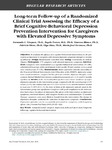Mostrar o rexistro simple do ítem
Long-term Follow-up of a Randomized Clinical Trial Assessing the Efficacy of a Brief Cognitive-Behavioral Depression Prevention Intervention for Caregivers with Elevated Depressive Symptoms
| dc.contributor.author | Vázquez, Fernando L. | |
| dc.contributor.author | Torres, Ángela J. | |
| dc.contributor.author | Blanco Seoane, Vanessa | |
| dc.contributor.author | Otero, Patricia | |
| dc.contributor.author | Díaz, Olga | |
| dc.contributor.author | Ferraces, María José | |
| dc.date.accessioned | 2024-02-02T08:26:30Z | |
| dc.date.issued | 2016-02-27 | |
| dc.identifier.citation | Vázquez, F. L., Torres, Á., Blanco, V., Otero, P., Díaz, O., & Ferraces, M. J. (2016). Long-term follow-up of a randomized clinical trial assessing the efficacy of a brief cognitive-behavioral depression prevention intervention for caregivers with elevated depressive symptoms. The American Journal of Geriatric Psychiatry, 24(6), 421-432. | es_ES |
| dc.identifier.issn | 1064-7481 | |
| dc.identifier.uri | http://hdl.handle.net/2183/35350 | |
| dc.description.abstract | [Abstrac] Objectives: To evaluate the efficacy of a cognitive-behavioral intervention for the prevention of depression in caregivers with elevated depressive symptoms through 12 months of follow-up. Design: Randomized controlled trial. Setting: Community in Galicia (Spain). Participants: 170 caregivers with elevated depressive symptoms. Interventions: Caregivers were randomized to a cognitive-behavioral intervention (N = 88), administered to groups of five participants in five weekly 90-min sessions, or to a usual care control group (N = 82). Measurements: Major depressive episodes (according to the Structured Clinical Interview for Axis I Disorders of the DSM-IV), depressive symptoms, emotional distress, caregiver burden, pleasant activities, depressive thoughts, social contacts.Trained blinded interviewers conducted assessments at 1, 3, 6, and 12 months of follow-up. Results: At the 12-month follow-up, there was a lower incidence of major depressive episodes in the intervention group compared with the control group (3.4% versus 22.0%).The relative risk was 0.15 (95% CI: 0.05–0.51) and the number needed to treat was 5 (95% CI: 3–11).The time of delay of the depressive episode onset in the intervention group was significant. Caregivers with good compliance to the intervention had a lower incidence of epression.The effects of the intervention on depressive symptoms, emotional distress, and caregiver burden were maintained for 12 months. Younger caregivers were more likely to benefit from the intervention. The change in depressive thoughts mediated the reduction in depressive symptoms. Conclusions: Depressive episodes can be successfully prevented in caregivers, with long-term effects. (Am J Geriatr Psychiatry 2016; 24:421–432) | es_ES |
| dc.description.sponsorship | This study was funded by grant 2007/PN017 from the Ministry of Labor and Social Affairs of Spain. | es_ES |
| dc.description.sponsorship | Ministerio de Trabajo y Asuntos Sociales; 2007/PN017 | es_ES |
| dc.language.iso | eng | es_ES |
| dc.publisher | American Association for Geriatric Psychiatry | es_ES |
| dc.relation.uri | https://doi.org/10.1016/j.jagp.2016.02.050 | es_ES |
| dc.rights | © 2016 American Association for Geriatric Psychiatry. Published by Elsevier Inc. All rights reserved. | es_ES |
| dc.subject | Non-professional caregiver | es_ES |
| dc.subject | Depression | es_ES |
| dc.subject | Indicated prevention | es_ES |
| dc.subject | Long-term follow-up | es_ES |
| dc.subject | Cognitive-behavioral intervention | es_ES |
| dc.title | Long-term Follow-up of a Randomized Clinical Trial Assessing the Efficacy of a Brief Cognitive-Behavioral Depression Prevention Intervention for Caregivers with Elevated Depressive Symptoms | es_ES |
| dc.type | info:eu-repo/semantics/article | es_ES |
| dc.rights.access | info:eu-repo/semantics/embargoedAccess | es_ES |
| dc.date.embargoEndDate | 9999-99-99 | es_ES |
| dc.date.embargoLift | 10007-06-07 | |
| UDC.journalTitle | American Journal of Geriatric Psychiatry. | es_ES |
| UDC.volume | 24 | es_ES |
| UDC.issue | 6 | es_ES |
| UDC.startPage | 421 | es_ES |
| UDC.endPage | 432 | es_ES |
Ficheiros no ítem
Este ítem aparece na(s) seguinte(s) colección(s)
-
UI- UIPSAL - Artigos [24]






